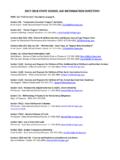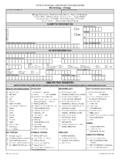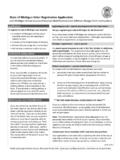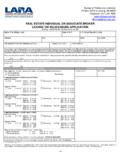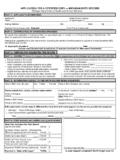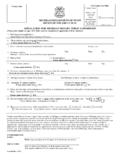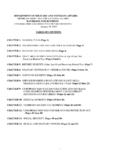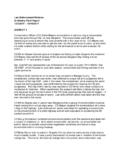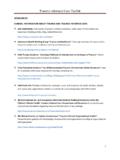Transcription of Guide to Starting and Operating - Michigan
1 TABLE OF CONTENTS Introduction 1 Personal Assessment 2 Steps to Starting a Small business 3 business Plan Outline 14 Ways to Legally Structure a business and Registering a business Name 21 Licenses, Permits and Other Regulations 26 business Taxes 29 Being Self-Employed 32 Hiring Employees 34 Financing a business 40 Managing a business 43 Insurance 46 Selling to Government 48 Procurement Technical Assistance Centers (PTAC s) 49 Now What? 50 Appendix A Employee or Independent Contractor 51 Appendix B Required Workplace Posters 53 Appendix C Small business Development Centers (MI-SBDCs) 55 Appendix D business Resource Centers (BRCs) 57 Appendix E Index of State and Federal Government Websites 59 Appendix F About the Small business Administration (SBA) 61 Revised October 2014 1 Welcome to the Guide to Starting and Operating a Small business : Helping businesses to open and grow is a key activity of the Michigan Economic Development Corporation (MEDC) and state government in general.
2 Starting a business can be a complex and difficult process. This Guide is designed to ease a person s entry into the business world, outlining as clearly as possible many of the issues and questions facing prospective and existing entrepreneurs. Information included in this Guide is both general and Michigan -specific: Steps and process for Starting a business ; different forms of business organization; key elements of a business plan; complying with federal, state and local tax obligations; basics related to management, hiring, marketing, and more. Though this Guide is not a substitute for legal or financial counsel, it is an information resource and quick reference designed to make the process of Starting and Operating a business in Michigan a little less overwhelming.
3 The information in this publication was accurate at time of publication, but it is subject to change due to revisions in law and administrative policies. Between published revisions, an online version is updated periodically if significant changes occur. The online PDF version can be accessed at: #sbdc In addition to this Guide , there are many other resources available for Starting and Operating a business in Michigan : Michigan Small business Development Centers (MI-SBDCs) SCORE -- Counselors to America s Small Businesses Assistance and counseling are also available from local economic development organizations, trade associations, local chambers of commerce, schools, community colleges, universities and public libraries.
4 This Guide will help you get started! For additional information, visit , contact any one of the MI-SBDC offices located around the state, or call MI-SBDC headquarters at Grand Valley State University: Sincerely, Carol Lopucki State Director Michigan Small business Development Center 2 PERSONAL ASSESSMENT Are You Ready to Start a business ? A short personal assessment tool. Being your own boss is wonderfully exciting, but isn t for everyone. Anyone considering Starting a business needs first to consider if they are suited for it, personally and professionally. There is no right or wrong answer to each of these questions. This is a self-evaluation to help you think through critical aspects of your personal and business readiness to be self-employed.
5 It is designed to help you assess your reasons and qualifications for going into business , to help you set personal and business goals, consider if this is the right time to start a business , if you have the freedom, flexibility and resources to start a business , to consider your health and stamina, and how you will balance family and business . Suggestion: It is recommended that you bring a completed version of this self-assessment to your first MI -SBDC counseling session. It will provide a profile of you and your readiness and help your counselor become acquainted with you. To self-assess, ask yourself the following questions and answer as honestly and in as much detail as possible. SELF ASSESSMENT: Are You Ready To Be In business ?
6 1. Why do I want to start a business ? OR Why am I in business ? 2. Specifically, what kind of business do I want to start (or am I in)? 3. Why do I believe I can make this type of business work? 4. Why do I believe this type of business is sustainable? 5. What education, skill or experience do I have in this industry? 6. What is my true purpose and/or the goal I hope to accomplish with this business ? 7. What is the financial goal I am seeking to achieve? 8. If I will need financing, do I have the resources and credit worthiness necessary to be eligible? [High credit score plus assets, collateral and good financial history.] 9. What are my strengths? 10. What are my weaknesses? 11. What is my physical, mental and emotional health and stamina?
7 12. What knowledge and skills do I have to start and control the day-to-day operations of a business ? 13. Do I know and understand the technology necessary to be competitive in this business ? 14. Do I have good judgment in people and ideas? 15. What sacrifices and risks am I willing to take to be successful? 16. What will it take for me to balance personal life and business demands? 3 STEPS TO Starting A SMALL business What do I need to do and what comes first? That s the question most often asked by people considering Starting a business . There is a logical sequence of actions and a process for Starting a business . MI-SBDC has created a checklist of that process: Steps to Starting a business charts the tasks in recommended order to help you stay on track, manage the various steps, and give you the confidence of knowing you have considered all the essential elements.
8 An explanation of each step follows the chart. 4 STEPS TO Starting A business (CONTINUED) 1. Select a business idea. Step #1 is deciding on what type of business you want to start. Many people choose to start a business around something they know and are passionate about. The first question every would-be business owner needs to ask about his/her product or service idea: What PROBLEM does it SOLVE or what NEED does it FILL? There are many reasons why consumers make purchase decisions, but the primary one is need. Market research will help you answer this question. 2. Market Research (Feasibility) Market research is the first and most important task you need to accomplish BEFORE you start your business , to determine if your idea is feasible, which according to Webster s Dictionary means capable of being done; suitable.
9 Market research is the gathering of facts and figures to make an informed decision about the market potential for your business , about the prospects for success and the direction your business will take. A. Type of Research Needed: Industry, market, customers, competition. You ll be looking for answers to questions like: How big is the industry my business fits into? What are the trends of that industry? How will my idea benefit customers? Who and how many potential customers are there? How many competitors are there? What is unique about my product or service? What will motivate customers to buy from me? The following describes the type of research needed using the example of a pizza parlor, which is part of the fast food industry: Industry is the BIG PICTURE of what s happening in the total world of your particular type of business .
10 Look for answers to questions like: What s happening in the fast food industry these days how many pizzas get sold in the US or Michigan each year, are there increased sales, specialty pizzas, healthier alternatives, changes in sizes or packaging, more or less pizza parlors in and out of business , etc? What s the BIG PICTURE in the pizza world? Market is population of consumers or businesses that buy your particular product or service you can generally define them by a common set of characteristics. Market segments are groups within that population that you can define by even more specific set or sets of characteristics. Questions to answer could include: Who and how many folks are buying fast food in the area or location I m considering?
